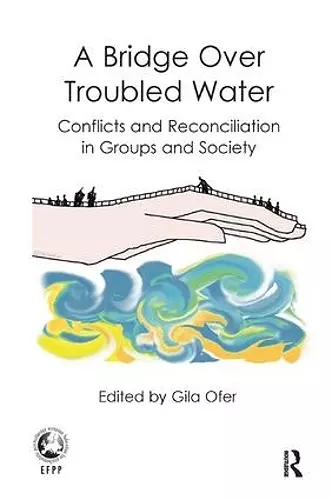A Bridge Over Troubled Water
Conflicts and Reconciliation in Groups and Society
Gila Ofer author Gila Ofer editor
Format:Paperback
Publisher:Taylor & Francis Ltd
Published:31st Jul '17
Currently unavailable, and unfortunately no date known when it will be back
This paperback is available in another edition too:
- Hardback£135.00(9780367104375)

This book is a compilation of papers by different authors, among them Vamik Volkan, Robi Friedman, John Schlapobersky, Haim Weinberg, and Michael Bucholz, with a foreword by Earl Hopper and an introduction by Gila Ofer, both editor and contributor. While most of the writers are group analysts, working in the tradition of Foulkes, several others come from different though complementary perspectives, enriching the theoretical basis of the research. So, there are perspectives, inter alia, from Bion and Cortesao. The writers represent different countries and cultures, focusing on problems that are endemic to their own localities that yet have a wider and deeper resonance. We are introduced to conflict and division in Bedouin society, the Roma people living in Greece, citizens' reflective communities in Serbia, continuing territorial and ideological differences in Israel and the middle-east, and tensions of difference in the psychoanalytic community itself.The book throws light on some of society's most intractable problems, generating compassion and understanding in place of hatred and division. If we have mostly become wary of hope and optimism in an embattled world, the message that reconciliation and forgiveness are possible, and that there are practical steps to achieving this, rather than idle dreams, makes this an important book with relevance to all those trying to make sense of present times and finding their role as responsible citizens.
'In a fractious time, Gila Ofer has responded with a book that offers hope, direction and much-needed wisdom in addressing the manifest and unconscious forces that contribute to conflict, destruction, reconciliation and repair. Those who think and write about the experience of the mind, of self, and of other, have much to contribute to the seminal reflection our societies require to create generative solutions to complex challenges. The international panel of experts writing in this book, many with lived experience of state and political conflict, offers a rich and deeply textured resource to our field.'- Molyn Leszcz, Professor and Vice Chair Clinical, University of Toronto Department of Psychiatry, and Psychiatrist-in-Chief at Sinai Health System, Toronto'In a world dominated by conflicts that very often turn into wars, this book presents a multi-faceted perspective on conflicts and their resolution, which is applicable to individuals, groups and society. The contributors throw light on some of society's most intractable problems, generating compassion and understanding in place of hatred and division. If we have perhaps become wary of hope and optimism in an embattled world, the message that reconciliation and forgiveness are possible rather than idle dreams, and that there are practical steps to achieving this, makes this an important book with relevance to all those trying to make sense of present times and finding their role as responsible citizens.'- Morris Nitsun, consultant clinical psychologist in group psychotherapy in Camden and Islington NHS Foundation Trust, a training group analyst at the Institute of Group Analysis, and author of Beyond the Anti-Group: Survival and Transformation'This is a major addition to the theory and practice of group therapy and applied group work on conflicts and reconciliations in groups and societies. Group analysis, which twists and stretches among the three pillars of psychoanalysis, sociology and group dynamics like a Mobius strip, is presented here as versatile appreciation of the systemic relations among these three revolutionary disciplines. Even if this is a profoundly complex and challenging project, the vision of group analysis which this book offers is an impressive one.'- Ulrich Schultz-Venrath, professor of psychosomatics and psychotherapy, University of Witten/Herdecke, Germany
ISBN: 9781782205777
Dimensions: unknown
Weight: unknown
248 pages